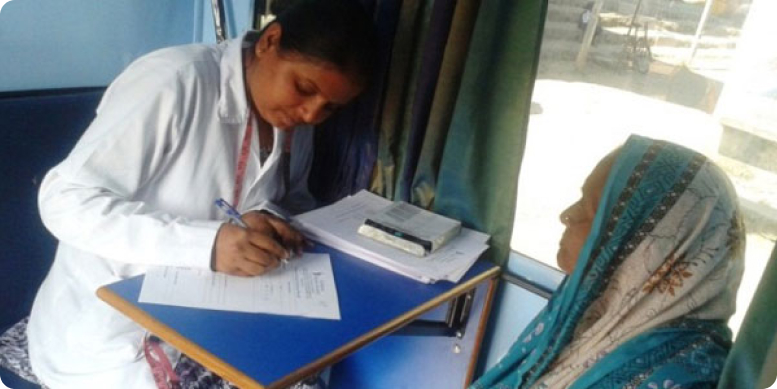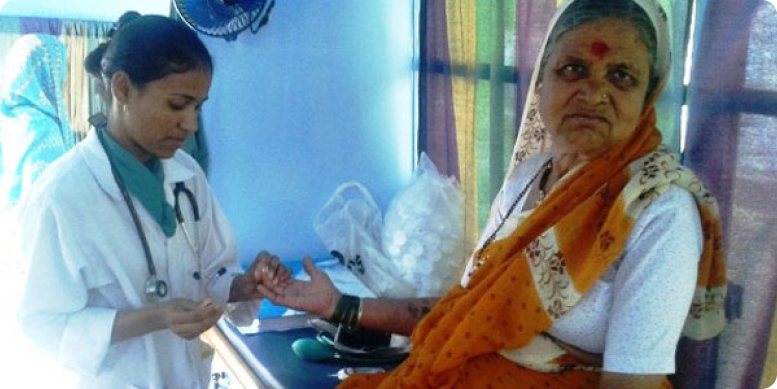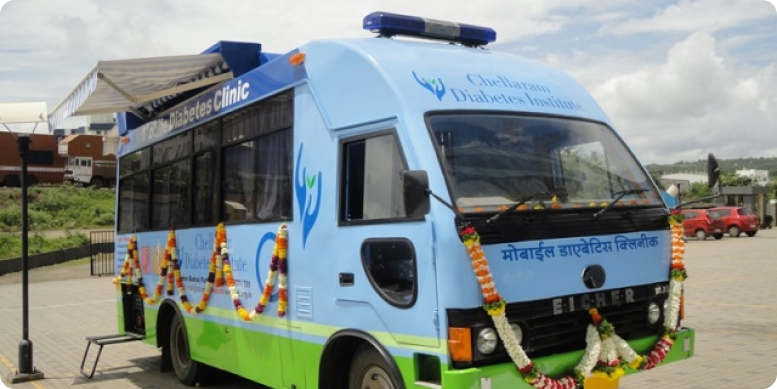
Mobile Diabetes Clinic
Most rural men and women are hard workers in the agricultural sector and may not be able to afford healthcare due to high cost, and appropriate health services may not be available or accessible by them. There is also a lack of awareness about Diabetes Care in rural area.
To address this situation, Chellaram Diabetes Institute (CDI) launched its ambitious Outreach Program through Mobile Diabetes Clinics, on the 26th September 2012 from village Shiroli Khurd of Maharashtra, India.
The program is a philanthropic initiative of CDI for the under privileged people of the rural area of Pune district. It involves taking the Mobile Clinic to the villagers door step for the purpose of – Patient Care, Education and Awareness – for Diabetes & its Complications.
CDI’s Out Patient Clinic at Pune is responsible for the co-ordination and planning of the Outreach Programme.
Salient Features of the Outreach Program
- The Program works hand-in-hand with Local Government Bodies in the rural areas.
- The Operations are akin to a Hub & Spoke Model – A hub is one of the town of Pune district, identified to station the mobile clinic and staff. About 40 – 50 villages within a 15-40 km radius from the Hub, with a population of about 1500 – 3000 and with no doctor available or no medical facilities are chosen for the visit by Mobile Diabetes Clinic. The mobile clinic team stays in the hub and from there; the team goes out on every day of the week to visit the villages.
- The Mobile Clinic’s team consists of 1 Doctor, 2 Nurses and 1 Driver-cum-coordinator; a local Social Worker (Female Health Volunteer) from the village helps the team in liaison with the villagers.
- ASHA (Accredited Social Health Activist) in each of these villages is identified well in advance and trained by way of a well-designed questionnaire in the Local Language (Marathi) on Diabetes related symptoms with respect to Eye, Foot and Pregnancy issues.

ASHA Training
The Social Worker goes to as many households as possible in the village and fills up the questionnaire. Based on the responses she gets, she will identify and enlist those with diabetes/at risk of diabetes.
In one of the protocol, the ASHA goes to as many households and does Random Blood Glucose test. The villagers having Random Blood Glucose more than 140 mg/dl are advised to visit the Mobile Diabetes Clinic.

Villagers availing the services
Those shortlisted people are asked to assemble at a point in the village – mostly near the Public Health Sub-Centre – on the day of the visit on a pre-agreed date.
On that date detailed data of the subjects are captured at the time of registration – Name, Sex, Age, History of past & present illnesses, Weight, Height, BMI, etc. which are all taken down by a trained Nurse.

History taking in First Cabin
On that date detailed data of the subjects are captured at the time of registration – Name, Sex, Age, History of past & present illnesses, Weight, Height, BMI, etc. which are all taken down by a trained Nurse.

Basic tests in Second Cabin
In addition, Random blood sugar and BP are recorded. In case of pregnant women, OGTT (Oral Glucose Tolerance Test) is also done.
Urine sugar and protein Tests are done.
Simple testing of the Eyes for noticeable cataract is performed.
Mono Filaments and tuning forks are used for Foot Disorders.
All the results are recorded and fed into user-friendly software for data processing.
More than 23000 patients with Diabetes, Gestational Diabetes, Diabetic Foot and Diabetic Ophthalmic complications are either treated or referred after thorough counselling.
In every village at least 4 persons are first time diagnosed with Diabetes.
The data collected from these villages could prove to be a very meaningful source of information for carrying out any prevalence study / epidemiological studies and any other basic science studies.
Foot Care at Mobile Clinic


Second Mobile Diabetes Clinic

Mobile Diabetes Clinic-2
The Institute launched its second Mobile Diabetes Clinic on 04.09.2013 from Kiwale, a remote village of Khed block of Pune District. The clinic provides specialized Diabetes care to the selected 10 remote villages of Khed block.
HbA1C testing
A point of care HbA1c testing machine is used in the mobile clinic to check HbA1c of the villagers.

Fundus Camera
Along with the basic features like first mobile clinic, it is equipped with advanced instruments like Fundus Camera and Biothesiometer, ankle brachial index and ECG. The fundus camera in used to detect retinopathies especially Diabetic Retinopathy, Glaucoma and cataract, the most common ophthalmic illnesses occur in Diabetes.

Biothesiometer
Diabetic Neuropathy is also very common in patients with Diabetes. The Biothesiometer is used to detect the level of loss of sensation in foot.
The Second Mobile Diabetes Clinic is also getting very good response and provided services to more than 4500 people in the first month.




